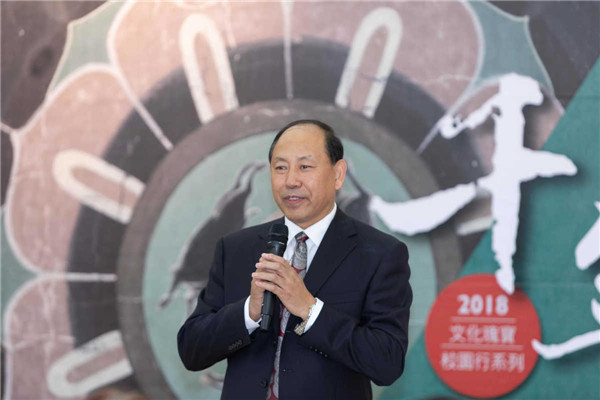'Digital donors' the new saviors of Mogao Grottoes

Yang Xiuqing speaks at an exhibition on the Mogao Grottoes held in Taiwan in 2018. [Photo provided to China Daily]
Crowdfunding is playing a greater role in protecting the famous heritage site
A "digital donor" project to help protect cave No 55 at the Mogao Grottoes heritage site in Dunhuang, Gansu province, had raised over 1.9 million yuan ($290,000) by last month, organizers said.
Initiated in 2018, the crowdfunding program enables people to donate 0.9 yuan on WeChat after watching a short video about the history of the cave, which is one of the Buddhist art treasures at the world-famous site.
Yang Xiuqing, director of the China Dunhuang Grottoes Conservation Research Foundation and an initiator of the project, said it encourages the public, especially young people, to learn about the relics and help in their protection.
The Mogao Grottoes, a UNESCO World Heritage site with numerous ancient murals and Buddhist statues in 735 caves, have faced challenges due to natural erosion and human intrusion. The number of tourist visits to the grottoes surged from 26,000 in 1979, when they opened to the public, to a peak of 2.2 million in 2019.
The number of visits fell to 1.39 million last year due to the novel coronavirus outbreak.
Due to their age, the relics need to undergo continuous preservation work, experts said. It's not unusual for tourists to see statues missing limbs and faded frescoes at the site.
"Though the country is increasing preservation investment, the protection work needs the participation of more people," Yang said, adding the success of the program showed the growing interest of young people in Dunhuang culture.
"It's an art treasure house, with complete and rich content, that has survived despite a changing history," he said.
"It also offers precious historic material to study politics, economics, warfare, culture, the art of the ancient Chinese and exchanges with foreign civilizations."
The grottoes were dug thousands of years ago by Buddhist believers, including monks, royalties, officials, merchants and ordinary people, who made donations for their construction and maintenance.
"Now, we hope to cultivate the new generation of digital donators to help the relics survive another 1,000 years," Yang said.
A crowdfunding project for cave No 427 was launched recently and has already received 100,000 yuan from one group.
-
As AI encounters Dunhuang's art, the ancient caisson ceiling bridges centuries to the present.
View all stories

 Gansu thrives from green development
Gansu thrives from green development  >
>